Peter MALONE
Final Set/ Cinquieme Set
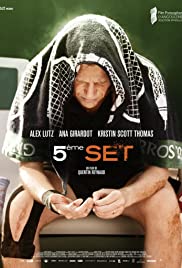
FINAL SET /CINQUIEME SET
France, 2020, 105 minutes, Colour.
Alex Lutz, Ana Girardot, Kristin Scott Thomas.
Directed by Quentin Reynaud.
From the title, it is no surprise to realise that this is a tennis film. And, for those who are tennis fans, quite a deal to enjoy. And, for those who are not tennis fans, this is a drama about ambition, seeming failure, disappointment, rekindled hopes and…
At the centre of this story is a 37-year-old veteran tennis player, with the unusual French name of Thomas J. Edison. His played with quite some intensity by Alex Lutz. We quickly learn that he had a disastrous match in 2001, injury, failure, a disappointment to the public because he was an emerging French hero of the tennis court. In 2019, there is another 17-year-old tennis player whom the crowds are hailing, Damien Thosso.
Edison is very conscious of the injuries to his knee and leg, able to analyse x-rays with great accuracy to his doctor. But, he wants to play again, to make a comeback, able to list a variety of players who achieved success and rank in their 30s, including Jimmy Connors. Is it possible? And, what of his devoted wife, a former tennis player who played for clubs, Eve (Ana Girardot) but who has sacrificed a lot of her life staying at home with the young son, Gaspard. With the seeming termination of his tennis career insight, Eve is hoping to start a course on Sports Management, something for herself.
And, at first in the background, then coming into the foreground, Edison’s mother, as they say, formidable. And, as played by Kristin Scott Thomas, this is not just a mother-role, this is a mother with dominant influence, coaching him in the past, disappointed in his failure, wondering about his mental stamina for success. And, she is not afraid to voice her opinions. Towards the end of the film, there is a strong sequence, a frank exchange between mother and son, an opportunity for the son to express his frustrations, his disappointments, his driving hopes.
Edison is able to participate in the qualifying rounds for the French Open. He participates in a number of rounds – some scenes of playing, some focus on the scoreboard, some of the aftermath, especially with his injuries and the blood coming from his hand.
There is quite some drama about Edison, his attitudes, his moods (even with his good friend who trains him), and the issue of possibilities for further tournaments and the offer of a commercial contract for advertising.
The title indicates that there will be five sets – and this is in the first round of the French Open, and his draw is against the up-and-coming Damien Thosso. Needless to say, it will be something of a marathon – and this is where the film incorperates quite a number of serves, rallies, glancing shots, crowd enthusiasm, physical strain.
And, if this is what the audience would want, Final Set, the fifth set, certainly supplies it.
1. Title? A tennis film? Players, training, ambitions? Match scenes?
2. The French setting, French tennis players, contemporary references, tennis players of the past? The French Open?
3. Paris, ordinary homes, tennis courts, training, play? Changing rooms? Atmosphere? Musical score?
4. The story of Thomas J. Edison, age 37, his career, collapse, the long gap and professional playing, ambition to move into competitive tennis again? The background of his childhood, training, the influence of his mother, her coaching, her opinion, that he did not have a competitive mindset? Teenage, French champion, acclaim? The collapse, his defeat? 18 years passing? His decision to make a comeback? To play in the qualifying matches? To get into the French Open? His list of players who achieved in their 30s?
5. Edison and his character, accusations of being self-absorbed, his marriage, relationship with Eve, the years, his love for Gaspard? Domestic sequences? His visit to the doctor, the x-rays, his accurate analysis of what was wrong with his knees, arthritis…? His decision to go ahead? Tending his knee, his leg, his hands, the blood? His friend and the scenes of training?
6. Eve, her character, former tennis player, for the clubs? Her marriage, love for Edison? Love for their son? Sacrificing herself, home duties? Her wanting to study, Sports Management? Edison and his promises, about to break them? The clash with him, wanting to walk out with their son? Yet attending the matches, supporting him?
7. Edison’s mother, Kristin Scott Thomas’ character, strong, strong-minded, her past and coaching her son, her estimation him, his defeat, her inability to support him after that? The visits, the meals, love for her grandson? The discussions with her son, Frank, his accusations against her, her saying she was sorry? Her being present at the match in the French Open? Sympathy?
8. The up-and-coming tennis player, Damien Thosso, age 17, the crowds, his skills, the posters, advertising, television? The draw to play Edison? The details of the match, their respective skills? Thosso and his upset, smashing rackets…?
9. Edison and his social life, friends, Gaspard’s birthday party? The driver and the betting against him? His moodiness? The approach for the commercial contract, the social, the effect on Eve?
10. The inclusion of the qualifying matches throughout the film, the excerpts, the scores, the impact on Edison, physical, the blood, the showers, his knee? The French Open match, the tension, the detail of the play?
11. A film for tennis fans – but for those interested in a drama about a man and his ambitions, their being thwarted, the drive to achieve some ambitions, exertion, failure?
Broken Dreams
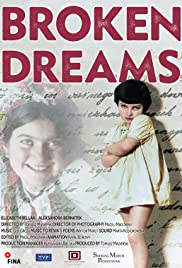
BROKEN DREAMS
Poland, 2019, 70 minutes, Colour/black and white.
Elizabeth Bellak, Aleksandra Bernatek.
Directed by Tomasz Magierski.
The synopsis of his film written by the director:
The compelling story of two Jewish teenage sisters struggling to survive the Holocaust in Nazi occupied Poland. They are both talented: Ariana Elizabeth Bellak (born Ariana Spiegel), a child prodigy, performs on stage in Warsaw shortly before the war. She sings, plays piano, and recites poems. She also appears in several feature films by famous Polish directors and is commonly referred to as the "Polish Shirley Temple". She is nine years old when the war starts. Renia is more introverted, romantic and sensitive. She is a gifted poet who keeps a diary spanning the years 1939 to 1942. Ariana, who currently lives in New York, narrates her story on screen. Her narration intertwines with text from Renia's diary recited by Aleksandra Bernatek, an actress from their home town of Przemysl.
The film opens with a performance in theatre, an elderly woman narrating, singing, reminiscing in English. She is Ariana Bellak, telling stories about herself and her past, especially as a child prodigy before World War II, in her Polish town near Romania, visits to Warsaw, her abilities to sing, recite poetry, and a film career. She also tells stories about her sister, Renia, writer of a diary, with excerpts throughout the film – and the information that the diary was translated into many languages and published in 2019.
There is some contemporary footage from the Polish countryside. However, there is a great deal of documentary war footage, footage of the ghetto in Warsaw. There is also the story of the girl’s mother, her appearance, disappearance, the loss of Renia, mother, and Ariana reunited and eventually sailing to the United States in 1946.
The family is Jewish. However, they shared some of the experience of Jewish families being sheltered by Catholics, especially Catholic nuns – and there is a tribute to them as well as some footage of life in the convent where Ariana was sheltered.
This brief documentary takes its place amongst so many of the stories of Poland in World War II – with touches of the exotic in Ariana’s career as a child and later in the United States and the memories of Anne Frank and war diaries.
Menendez: Blood Brothers
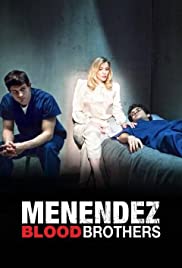
MENENDEZ: BLOOD BROTHERS
US, 2017, 90 minutes, Colour.
Nico Tortorello, Myko Olivier, Benito Martinez, Courtney Love, Meredith Scott Lynn.
Directed by Fenton Bailey, Randy Barbato.
In 1989 there was a drama in Los Angeles, the murders of an affluent couple, Menendez, initially thought to be the work of home invaders, but in 1990, the two sons, Menendez, arrested for the murder of their parents.
This was a cause celebre at the time, featured in the media. In 1994, while the trials for the two sons were still going on, there was a strong television miniseries, A Killing in Beverley Hills. The present television film is brief, highlighting the two brothers, the impact of their parents, a sexually abusive and ambitious father, a loving mother who did not protect her sons.
The initial focus of this film is on the younger son, Erik, hoping for a tennis career, playing and losing, upbraided by his father. Erik seems to bond with his mother, creating a story about agents and neglectful parents. The audience then sees, alarming if the story is not known, the father coming into the bedroom of his son and the revelation of a long history of sexual abuse, the screenplay indicating that his mother knew what was going on.
Then the older son, Lyle, returns from Harvard studies. The two brothers are close, Lyle having been abused, as well as having an episode with his younger brother when they were children. The discussions become intense, Erik somewhat neurotic, they decide to kill their parents, going out to buy rifles and a graphic sequence of the killing of the parents.
There is quite some impact on the fact that their mother is played by Courtney Love.
The film indicates that the brothers told the police that there were intruders. However, there is some extravagance in their lifestyle leading to suspicions and to arrests. There are a number of court cases over the years, each brother with his own lawyer, this film emphasising Erik's support from his lawyer, played by Meredith Scott Lynn.
The dialogue for the film during the court sequences is quite graphic, alarming in its revelation about sexual abuse, its effect (and prosecutors using the specious argument that a boy abused by a parent must be homosexual).
Eventually, the brothers were found guilty, taken to separate prisons and having only Internet connection to play chess for the next 20 or more years.
1. Audience knowledge of the 1989 case? Los Angeles, affluent parents, the two sons, the murder of the parents, the alibis of the sons, investigations, arrest, imprisonment, court cases, consequences?
2. The atmosphere of 1989, Los Angeles, homes and mansions, the business world, the tennis world, studies? The Latin American background, migration? Success in the United States?
3. The chapters of the narrative, the introduction to Eric Menendez and his mother, his being at home? Lyle, away at studies? Interstate? The father, migrant, successful business? His demands? Kitty, her background, marriage, relationship with her silence? (And the impact of Courtney Love in this role?)
4. The film, brief (in comparison with television footage of the period as well as the dramatic miniseries of 1994, A Killing in Beverley Hills)?
5. Audience response to Kitty, working with Erik, his typing, his story, intimations of violence? Later judgements on Kitty, her attitude towards her sons, loving her husband, putting up with his womanising, bullying, knowledge of his abuse, and not defending her sons, not protecting them? As motivation for their killing her?
6. Lyle, older than Erik, wanting to be protective, returning home, Erik and the continued abuse? Their mother not helping them? The revelation of the past and his abuse? And a sexual encounter as a child with Erik?
7. The focus on Erik, teenager, at home, tennis, his skills, family watching the match, his father calling out, heckling, his losing? His father's demands on him, yet his father's words of affirmation?
8. The audiences shock at the father going into Erik's room, the abuse? And its taking place over many years?
9. The drama written for the boys, their desperation, no way out, the psychological pressure, their killing their parents, going to buy the guns, shooting, Erik and his mother, thinking he shot her? Lyle shooting her?
10. Their plan, the police, the story of intruders? The carrying on with their lives? Imprudent as regards money, spending it? Issues of inheritance? Extravagance? Their lifestyle?
11. The police investigations, suspicions, gathering evidence, questioning evidence, the interrogations, the arrests? Their being charged?
12. Court proceedings, each with his own lawyer, Erik and his relationship with the Lansing, her skills, self-assurance, the meetings with Erik over the years, presentations in court? Lyle with his own lawyer and defence?
13. Testimony, the mixture of truth and lies? Evidence in the court? The evidence becoming more frank, more explicit, the reaction of the jurists, of the media? Audience sympathies towards the brothers? More towards Erik?
14. Erik, the letters written, the woman declaring her love, the court suggestions and testimony that he was homosexual, the specious reasons given in court for this, especially for an abuse victim? His correspondence with the woman and the eventual information that they married?
15. Cases over many years, hearings, split judgements? The effect of life in prison, how each of the brothers experienced it, the violence in prison, Power games?
16. The guilty verdict? The sentences? The brothers separated? Each in prison? Playing chess online? Not seeing each other for 21 years, the time of the making of this film?
17. Critical dismissing of this film, its brevity, its treatment of the characters, evidence, interpretation of the characters?
Irrepressible Woman, An/ Je ne reve de que vous
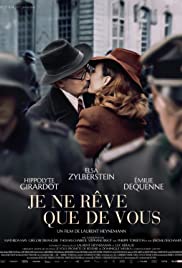
AN IRREPRESSIBLE WOMAN/JE NE REVE QUE DE VOUS
France, 2019, 102 minutes, Colour.
Elsa Zylberstein, Hippolyte Girardot, Emilie Dequenne, Mathilda May, Gregori Derangere, Thomas Chabrol, Stephane Bissot, Philippe Torreton, Jerome Deschamps, Fabrice Adde.
Directed by Laurent Heynemann.
The English title certainly captures the spirit of the central character, Janot Reichenburger, played with passionate intensity by Elsa Zylberstein, while the French title, the title of the song sung during the film, also by Janot, highlights her relationship with Leon Blum.
While the film opens in 1943 in Germany, Buchanfeld, a mansion owned by Himmler, the audience who does not know about Janot will be puzzled. She arrives with German soldiers – and the narrative goes into flashback.
In 1940, Janot meets with her first husband and her son. The husband intends to escape to Brazil and to be joined by his son who will leave France for New York with Janot’s second husband. There are tickets for her but she refuses to go. The reason for her refusal is her passion. She has been in admiration of former French premier, Leon Blum, a champion of social rights during the 1930s. She has been infatuated him since she first saw him when she was 16 and, after the death of his wife, wants to be with him.
The central action of the film shows the war but without any battle sequences. It is the story of Blum, his being apprehended, blamed by the Vichy government for France’s defeat by the Germans, but the Nazis wanting to condemn him for bringing on the war. He is interned in various prisons, for a long time one in the Pyrenees, with harsh conditions for an elderly man. Other government ministers, of both right and left, and with him, awaiting trial.
Janot is refused permission to see him but eventually is and passionate meetings. In the meantime, she has encountered Blum’s daughter-in-law, Renée (a sympathetic and strong performance from Emilie Dequenne) who is hostile, but carries letters to and from, eventually sharing the experience with Janot. The film also shows the number of wives, friends and daughters who live in the hotels near the prisoners, especially during the court cases.
Eventually, Blum is transferred to Buchenvald and after some negotiations, Janot is allowed to join him – where they are married by the Nazi commander. They experience the Allied bombing of Buchenvald and learn what the concentration camp really was.
The film is rather more swift than expected at the end, their survival, Janot’s son killed in action, yet leaving a daughter. Credits information indicate the work that both Blum and Janot did after the war, Janot surviving to 1989.
A different perspective on France and its experienced during the war, a reminder of French political history.
1. The two titles? The different emphases on Janot, her passion, her focus on Leon Blum?
2. France in the 1940s, the German invasion, the Vichy government, politics, martial The town, Leon Bloom and his career as Premier, social reform, the left, Jewish? The previous government, right and left wing, persecuted by the Vichy government, being blamed by the Germans?
3. The opening, you know in the car, the troops, arriving at Himmler’s mansion, Jerome welcoming her? Her voice-over of the letter to her grandchild? The narrative going into flashback? Questions raised?
4. Jeanne and her personality, strong and passionate, her first marriage to Torres, the divorce, her son, Georges, her second marriage to Reichenbach? Yet, her long obsession with Leon Blum, since she was 16, his being married, her divorces, her relationship with him?
5. The complexities of escaping from France, her husband going to New York, buying the ticket for her, her refusal to go, seeing her first husband, his going to Brazil? Georges, wanting to fight, going to New York, the later news of his going to Brazil? The news of her husband’s suicide in New York? The final news of Georges being killed in action?
6. The portrait of Leon Blum, age, experience, as Premier, a genial manner, principles? His marriage, widower? His son, in action, in the concentration camp? His relationship with Renée? His granddaughter? His passionate love for Janot?
7. The government treatment of Blum? His being free, at his home, being taken, internment, the different prisons, in the Pyrenees? For the court case? Isolation, with the other members of parliament, Mandel of the right wing and yet their bonding? News of political assassinations? The visits by Janot, Renee and her transporting the letters? Permits? The meetings? The transfer to Buchenvald? With Mandel? Life in Himmler’s château?
8. Janot, passionate, refused permits, the clashes with Renée? Renee and her carrying the letters? The incident with the bike chain? In the town, shared accommodation, the other wives and daughters? To the Pyrenees? The importance of her visits to Blum, the outpouring of passion?
9. Renee, quieter personality, acquired dress compared with Janot’s wardrobe, hostility, her husband a prisoner, her daughter in Switzerland, the connection with Blum? The gradual bonding with Janot? The visits, the shared room, in the dining room, a more peaceful woman?
10. The lawyer, the documents, women not allowed in the court, the information, the Resistance and the printing out of the hearings?
11. The time passing, from 1940 to 1943? The war but there not being any war sequences in this film? A different tone?
12. The singer married to the Minister, with the other women, paying her board by singing in the dining room? Mandel’s wife, Jewish actress, his daughter?
13. Janot, going to the Minister, persuading him to give her a pass, the travel to Buchenvald?
14. Life in the mansion, the walks, the soldiers, Jerome as the Jehovah Witness and conscientious objector, Mandel and memories of his wife and daughter? His being taken out, executed? Jerome’s birthday celebration, peeling the vegetables, domestic tone? Permission for the marriage, the Nazi official, the celebration?
15. The bombing, the Allies, the bombing of the concentration camp, and Janot and their realising what the camp was?
16. The quick move to the ending, repatriation at the end of the war, the news of Georges’ death, his daughter coming? And the information about their work after the war?
Shepherd, The/A Pasztor
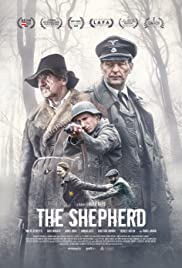
THE SHEPHERD/ A PASZTOR
Hungary, 2019, 91 minutes, Colour.
Miklos Szekely B, Akos Horvath.
Directed by Laszlo Illes.
The title looks very simple. And, in fact, for the first 15 minutes, there is a very slow contemplation of the shepherd himself, an elderly man, living alone, going through his routine with the sheep, his washing, preparing his breakfast, ready to go out into the fields.
Then the atmosphere begins to change, the shepherd discovering a number of dead bodies lying in the fields, Jews escaping from the authorities.
The narrative then makes a transition to the focus on the German soldiers, along the country road, van full of Jewish prisoners, a focus on the young soldier of only several months, and a sister and brother amongst the prisoners. When a tree blocks the road, the prisoners escape, leading to the pursuit and their being shot. The brother and sister try to escape together but are caught, the brother being shot, and, disturbingly graphic, the autocratic commander orders the young soldier to rape the woman. The shepherd finds the woman, wraps her in his overcoat and carries her to his house in safety.
While this is very grim, the portrait of the Germans is even grimmer, the commander supreme in his arrogance, the van driver cruel in his violence, the young man obedient to the authorities.
The last part of the film, the soldiers search the shepherd’s house and barn, talk with him, sharing drink, learn his story – but a refugee grandfather and his granddaughter are found in the barn and, disturbingly graphic again, are hanged.
The film is quite pessimistic in its picture of this Hungarian episode, symbolic of so much violence, killing, persecution of Jews in central Europe.
1. Simple title? The focus? The elderly man, widower, with his sheep, the opening, his washing, into the house, his breakfast, going out with the sheep? A long contemplative introduction to him and to the film?
2. The action taking place over one day? In winter? The clouds, the rain? The setting of the house, the fields, the woods, the road? The musical score?
3. Audience patience, the gradual introduction of the themes, hearing the shots, the dead bodies of those who fled, lying in the fields? The shepherd and the man leaning against the tree, the naked body of the woman? The response of the shepherd?
4. The transition in the action, the van on the road, the German soldiers, the prisoners inside, the range, Jewish, their fears, the sister urging her brother to make enquiries? The driver? The autocratic leader? The young recruit on guard in the van? The episode of the tree across the road?
5. The prisoners escaping, the young soldier being blamed? The pursuit? The ruthless shooting down of the escapees? Going more deeply into the woods, people hiding, people shot?
6. The focus on the sister and brother? Plan to escape, to the next village? The temporary success? Confronted, the brother and his wounds, against the tree? The sister and the approach of the soldiers? The commander, his ordering the young man to rape the sister? The effect on the man, threats, his compliance? The ordeal for the sister, the attack, the abuse, humiliation? Left naked? The brother watching?
7. The commander, the men, the fields, the shepherd and the sheep, going to his house?
8. The shepherd, finding the raped woman, the coat, carrying to her to the house, to save her, hiding her?
9. The soldiers, the examination of the house, sharing the drink, the conversation?
10. The revelation of the old grandfather and the granddaughter hiding, then being discovered, the threats, the rope, their being hanged?
11. The confrontation with the shepherd, the guns, his witnessing the hanging, the shock of his death? The sister escaping…?
12. A grim portrait of a war episode, Hungarian consciousness, a pessimistic version and interpretation of the events?
About Endlessness
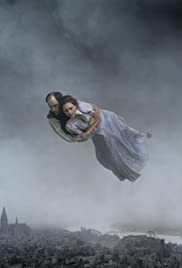
ABOUT ENDLESSNESS
Sweden, 2020, 76 minutes, Colour.
Directed by Roy Andersson.
For those not familiar with the films of Swedish director, Roy Andersson, a filmmaker from the 1960s to the present, a warning is needed. A prospective audience needs some kind of preparation for the experience of an Andersson film, especially when the word ‘endlessness’ is in its title.
Andersson is a cinema essayist. He is also a cinema philosopher. And he is a visual artist. And, expected narrative is not his forte. Which means that this is a special type of cinematic experience, an acceptance that the director is wanting to elicit a questioning response, a willingness to be challenged, and no expectations that one can put QED at the end of the film!
With that in mind, it is worth looking at the career of Roy Andersson, a director who has enjoyed Film Festival and critical acclaim (For Endlessness he won Best Director in Venice, 2020), with titles such as Songs from the Second Floor and, his film prior to Endlessness, A Pigeon Sat on a Branch Reflecting on Existence. So, here we are, reflecting on existence once again.
Andersson is Swedish, his first film made in 1967. He incorporates over half a century of Swedish culture into his films. And his settings are the city, a range of views of the city itself, looking over it from a hilltop park, then going into its streets, a variety of ordinary locations, shop windows, restaurants, homes, shops, the church… And, while his emphasis is on the visual, always in the background, sometimes very softly, a classical music accompaniment and a great deal of choral music.
So, Andersson has intellectual themes, visual illustrations, dramatic moments, asking for an emotional response which leads us back to our intellectual understanding and our philosophy.
And, audiences will notice that each episode is contained in a single frame, from a fixed camera, any action taking place within this fixed frame – except for one sequence where an embracing couple (who are seen in the clouds as the film opens) float over the ruins of the city of Cologne and the camera, almost imperceptibly, moves its way left across the screen.
Which means that coming into the film is something like entering an art gallery, requiring an audience to know something about what they are coming to see. Because it is cinema, the audience is moved on from frame to frame (or, if available, push the Pause button). The film is something of a gallery installation. There is the instant impact, the time available for contemplation, ultimately the cumulative effect of the images.
So, the question of endlessness. Never-ending, infinite… The timeless, endless existence of the universe. An infinite God? And there is a whole lot of waiting going on right throughout the film.
There is a sequence when a young student sits at home reading about thermonuclear dynamics, his sister playing with her hair, not exactly interested. He speculates that everything is part of continuing energy, the endless energy, changing its shape as it moves along – and that we are all part of this continuing energy, part of its endlessness. Good or bad? Just continued existence? We might have an end as individuals, we do. But the energy is endless.
There are, in fact, some narrative moments, an old man coming up steps and telling us about a school acquaintance who passes by without comment, the old man having heard him in the past – and this repeated later when the old man talks to his wife about the experience happening again.
But, the most significant narrative element starts with a Way of the Cross, a middle-aged man bearing a huge cross, coming up a city hill between buildings, the crowd yelling that he be crucified, bystanders gaping or yelling insults, a small group with whips hitting and kicking the man as he falls and gets up again. So, the introduction of a character resembling Jesus, a Christ-figure.
Then he wakes up. It has been a nightmare (a recurring nightmare) and he has a sense of nails through his hands. Some frames later, he goes to visit a psychiatrist, revealing his religious experiences, his sense of the loss of faith. And, the narrative continues when we see him vested in a church sacristy, preparing hosts and wine for communion, communicants seen kneeling through the sacristy door into the church, his drinking the wine, swigging it, unsteady on his feet, going out to distribute communion. And, later in the film, he bangs on the door of the psychiatrist, the rather starchy and immovable receptionist announcing that they are closing, the psychiatrist not helpful, saying he can’t miss a bus, their ousting the man, locking the door, and his still crying out asking what he must do as he has lost his faith.
So, an explicit theme, and the audience responding depending on their own religious and church experiences, whether Andersson is pro-faith, objectively looking at what faith might be, against faith in the contemporary world.
There is a grim execution scene, soldiers tying a prisoner to a post, his pleading and begging for his life…
And, unexpectedly, three Nazis in a bunker, collapsed and demoralised – and Hitler coming in, their attempts to Sig Heil, Hitler’s being ineffectual and walking out. Was Hitler a threat to our endlessness?
We have moved from image to image, such as a portly man reading his newspaper in a restaurant, sniffing and tasting the offered wine, but the waiter absentmindedly continuing to pour the wine as it overflows; a girl coming out of a shop to water and spray a plant, a young man passing and gazing; fussy grandmother trying to photograph the baby held up by the father and many more.
Throughout the film, each frame is introduced by a voice saying “I saw man….�, “I saw a woman…�. Finally the voice says that they saw a man driving a car along an empty road, flat countryside, trouble with the car engine, his getting out, looking in in, no one in sight, little prospect of someone passing by, little hope of help… And the film fades to black.
The running time the film is actually only an hour and a quarter – and one could spend at least that amount of time just beginning to explore the themes, Roy Andersson’s style, his provocations…
Kings of Capitol Hill
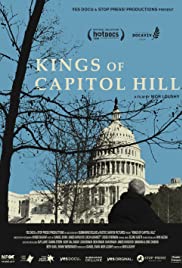
KINGS OF CAPITAL HILL/ HALOBBY
Israel, 2020, 90 minutes, Colour.
Directed by Mor Loushy.
AIPAC (American Israel Public Affairs Committee) is the subject of this engrossing documentary.
The committee was established in the 1960s, a liberal grass roots movement in the United States, promoting Israel but also concern about the fate of the Palestinians. And this continued until the 1990s when there was an ideological change, a move towards the right, wariness of the Oslo agreement, critique of Benjamin Netanyahu and, with the film devoting a lot of attention in the latter part to the Trump era, the moving of the American Embassy from Tel Aviv to Jerusalem, the admiration for Trump, and the action of the Committee and its lobbying with politicians on each side.
The range of talking heads is most interesting, past president, Tom Dine, who was eventually ousted, providing insights into the pre-1990s conduct of the Committee, its personalities, its influence. Most of the other speakers held positions in the Committee but were ousted or resigned. Their comments are insightfully critical – and, now, rather passionate but somewhat resigned.
This film can be seen along with another contemporary documentary ‘Til Kingdom Come, focusing on evangelical Christians, bonds with an Israeli organisation, fund-raising, dialogue, with visits to Israel by the Christians and the presence of organisation members in Kentucky at religious gatherings. (However, at the end, there is a very candid sequence of one of the Baptists speaking of his beliefs, the coming of the apocalypse, the tribulation, and the Jews having to convert.)
When this film was released, 2020 was the year of the US presidential elections. Watching the film if Trump had one would have been to enthuse about all that Trump had achieved, of Netanyahu’s bond with Trump, the hostility towards Iran, withdrawing from the nuclear pact, the transfer of the embassy…
However, watching the documentary in 2021, after Joe Biden’s victory, the perspective seems quite different. Trump has gone. While Biden supports Israel, there is not the jingoistic atmosphere of the Trump era. In fact, this documentary shows that a number of American politicians were reluctant to identify with AIPAC from 2018 (and one of those noted was future vice president, Kammala Harris). The statements by the current leaders of the Committee tend to be rather thundering, putting Trump on a pedestal.
While this documentary is interesting to contemporary audiences, it will be most interesting in the years ahead, assessing the Trump era and relationships between the US and Israel.
The director also made top documentaries, Censored Voices, about the Six-Day? War, the experience of the young soldiers, the retrospect, as well is The Oslo Diaries about the working for the peace accord in the 1990s.
Zappa
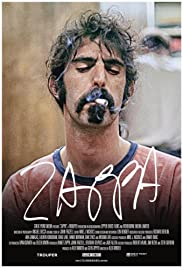
ZAPPA
US, 2020, 129 minutes, Colour.
Directed by Alex Winter.
Audiences will come to this documentary-portrait with different expectations. Many, younger, since it is almost 30 years since the death of Frank Zappa, may not know him at all. Others will have heard of him but his life and music not registering. And, there will be those who know his life and music, who have great admiration, who are critical, who want to be reminded of who he was, his musical heritage, what he achieved.
All potential audiences will not be disappointed.
Alex Winter is a long-time actor (best known for Bill and Ted) but also a long-time documentary director. He has known show business for many decades. And that is evident here in the range of talking heads incorporated into the documentary, Zappa’s wife and children, colleagues, co-workers, and a range of celebrities who knew him and/or have opinions about him.
Frank Zappa was born in 1940, died in 1993, a significant 50 years, a half-century of the second part of the 20th century. As we go through his career, the background of his life is built up, Italian origins, migrant tradition, grew up in the 40s, educated in the 1950s. Ready to enter into the enormous changes of the 1960s. While he lived something of a wild lifestyle, in common with many rock stars, he did not consider himself hippy and his style, was against drugs. In fact, he was something of a perfectionist in his work and in his expectations of himself and others.
It is surprising for those not familiar with him and his work, that he was such an international figure, excerpts throughout this film from various concerts, especially in different countries of Europe, early in the piece making significant contribution to Czechoslovakia and the politics following the fall of the Berlin Wall and the collapse of the Soviet Empire.
Of course, a great deal of attention is given to his music. While he had quite a range of rock music and performance, this was not exclusive. In fact, a lot of attention is given to the influence of the idiosyncratic composer, Varese, his notations, his sounds, his compositions. Which means that the Zappa was something of a classical composer – and, once again, there are a number of excerpts of performances of this style of music and communication.
We see the founding of the Mothers of Invention – and recurring talking heads of a great number of musicians who worked with Zappa – and who say he changed their lives and careers, especially the devoted Ruth Underwod.
On stage, however, there was a variety of impressions an impact, music theatre, performance art, the touches of cruelty, theatre of the absurd. And, in dire ways, the absurd entered his life with severe accidents and long convalescent periods.
Out of the limelight, just as himself, Frank Zappa seems to give an impression ordinariness – this is particularly the case when he is interviewed about his wife and relationship with her, his pride in his children, some clashes in production and interpretation with his daughter, Moon, his being sometimes distant, not hugging, at other times proud of his children. But the calm Zappa is seen especially when he is showing the director and the crew around his archive. And, it is an enormous archive of his compositions, recordings, performances, all meticulously ordered and dated, his wanting to have a record of his life, for himself more than for others.
Throughout the film there are clay figures. The story is told about who was a sculptor in clay, Bruce Bickford, encountered Zappa, created figurines, delighted Zappa and became part of his entourage, a significant figure in Zappa’s life and career.
This review is not familiar with Frank Zappa at all, except for his name and for passing references and the suggestion of touches of weirdness.
Many audiences, unfamiliar with Zappa, will join with this reviewer and be thankful for such a rich dramatic portrait, the heritage of music, the cultural challenges of the second part of the 20th century.
Monty Python: The Meaning of Live

MONTY PYTHON: THE MEANING OF LIVE
UK, 2014, 90 minutes, Colour.
The Python team, Chris Beach, Hollis Gilliam, Carol Cleveland, Mike Myers.
Directed by Roger Graef, James Rogan.
In 2014, the five living members of the Monty Python team decided to offer a final live concert. It was several decades after their last live concert and Graham Chapman had died. They continually remind us at this stage that they are 70 and over. They agreed that they should win their careers as Pythons to a concert climax, urged on by their producer, Chris Beach, assisted by Holly Gilliam, daughter of Python, Terry Gilliam. And, they decided that the concert should be filmed and released in cinemas all around the world.
For fans and devotees of Monty Python, this is, of course, more than a must.
While the fans can go back and watch the various episodes from their television series, can look at the various films that they made and enjoy them again and again, while they can listen to the music of the theatre piece, Spamalot, and while they can see how effective the subsequent careers of each member have been, John Cleese and comedy in film roles, Michael Palin and his acting as well as travel series on television, Terry Jones and directing films, Terry Gilliam achieving even greater success as a film director of many cult classics, and Eric Idle, the comedian, star of many films, and the creative talent behind this show.
Yes, they are in their 70s, but still full of humour and vitality – but, with his sad admission, Terry Jones was beginning to suffer from memory difficulties; and died a few years after this show.
While there are many of their favourite acts reproduced for this film, with the elaborate staging for the O2 Arena in London with its vast audience space and stage, the performance seen on the stage itself as well on large screens, this film is a documentary, not a film of the performance.
So, it is a behind-the-scenes documentary, the car seen in casual and serious mode, waiting to go on, dressing rooms, corridors, interacting with those working on stage, other performers, and some turning to the camera personnel themselves. These are revealing scenes of each of the Pythons with their distinctive personalities, interactions with each other, comments on each other.
The film also offers a history of the live performances of the Pythons, especially during the 1970s and up to 1980, in various countries, especially in the New York Center and, as they laugh, at the Hollywood Bowl.
They also offer some discussion about how they deal with the different moods of an audience, with an audience not laughing as expected, John Cleese illustrating this by comments on his silly walks performance, his not wanting to do it, and then it being well received and becoming part of his act. A lot of the discussion about the production comes from Eric idle as he talks about putting on the performance as well as his own performance. Fans will be familiar with many of the characters that they are seen to portray, a surprise being on the occasion of televising the material before 9 PM, the watershed issue, and Michael Palin in persuasive drag as a matron commenting on this censorship issue, mouthing a lot of words that give the film a higher censorship rating.
But, for enjoyment, there are quite a number of excerpts from the variety of concerts given in the past, some glimpses of the television shows (but not of the movies).
But, it is reassuring to see the group, each of the men in their 70s, John Cleese, in fact, 75. They seem to have aged very well, appreciate what happened with them in becoming the Monty Python Flying Circus, the contribution of Graham Chapman, exasperating as he was, especially with his drinking, the sadness of his death and many inserts here of footage with him. But they reflect on the effect of their acts, their humour, the serious dimension, the touch of rebellion, the questioning of conventions, and the place that they had in worldwide imagination (with some footage of Mick Jagger watching them on television and thinking of them as old men!) And their having Mike Myers on stage with them in the final show.
It ends, as might be expected, with the group on stage singing Always Look on the Bright Side of Life..
Alibi. com
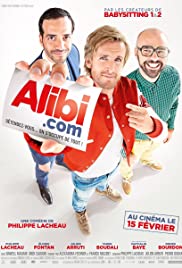
ALIBI. COM
France, 2017, 90 minutes, Colour.
Philippe Lacheau, Elodie Fontan, Julien Arruti, Tarek Boudadli, Didier Bourdon, Nathalie Baye, Nawell Madani.
Directed by Philippe Lacheau.
Very French comedy. Or, rather, a lighthearted French farce with quite some amusement, some laugh out loud moments.
The film lives up to its title. Writer-director and star, Philippe Lacheau, plays Gregory, who runs a company which provides alibis for quite a ride range of characters, mainly men, some women, and a little boy who wants excuses to skip school. (The film ends with many of themgetting their comeuppance, the boy left stranded at the gates of a boarding school!) The film opens with a series of episodes illustrating the wide range (and ingenuity, of the alibis created.
Gregory is assisted by Augustin (Julien Arruti) something of a nerd who has been devoted to Gregory for a long time. And Gregory is interviewing a rather dapper candidate to join the team, a Muslim, Mehdi (Tarek Boudali).
It all changes when they see a dog tied to a tree and they untie it, commenting badly on careless dog owners, the dog running away and getting hit by a car, when its owner, who has had an emergency and had to go behind a tree, emerges. Gregory has a plausible explanation, is attracted by Flo (Elodie Fontan) and romance ensues. When she invites him to meet her parents, he discovers that her father is one of his philandering clients.
Flo, in fact, says she is a solicitor, wanting to expose all kinds of frauds. Gregory says he is a flight attendant! All kinds of farcical situations follow, Flo’s father going on his romantic weekend, instead of a pharmacy convention, with a singer who with has expensive tastes. His wife, Nathalie Baye, looking at his computer finds out where he is and surprises him. He takes it in his stride, smooth and his excuses, explaining himself to Flo. In fact, the older couple acknowledge the sternness of their marriage and make up.
However, Gregory said he would be in Tanzania and is at pains to send photos of himself with a zebra, he and his team going to a zoo, trying to get a photo, the zebra running away, complications with Gypsy owners of the zebra… In the meantime Augustin gets caught up with a group of partygoers and lets his hair down. Mehdi, on the other hand, is on surveillance, floating on the water, sleeping and getting sunburnt!
Gregory finishes up in jail because of the stealing of the zebra. On release, some thugs threaten him and he encourages them to harm him because of his failure with Flo (who, fortunately, is outside the door listening in).
A bit of French fluff. Undemanding (except on the characters and their alibis) light entertainment.